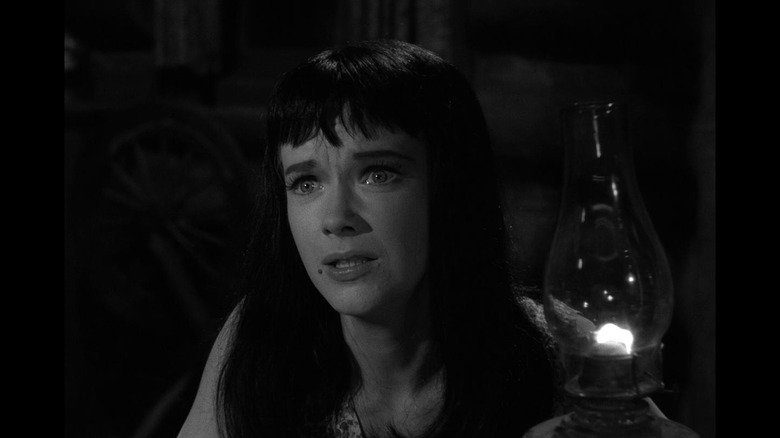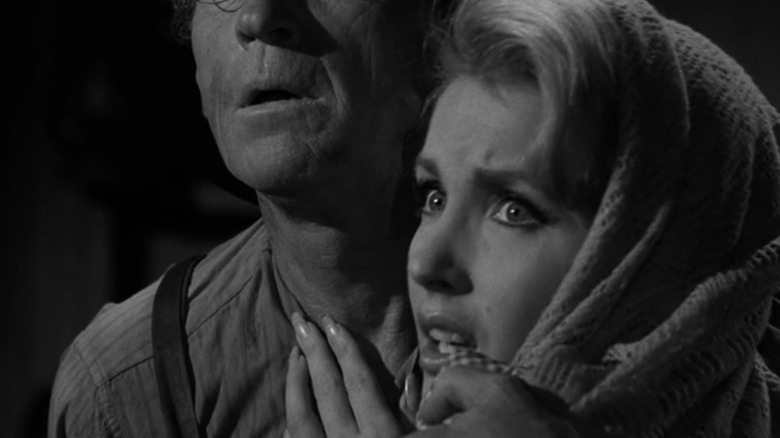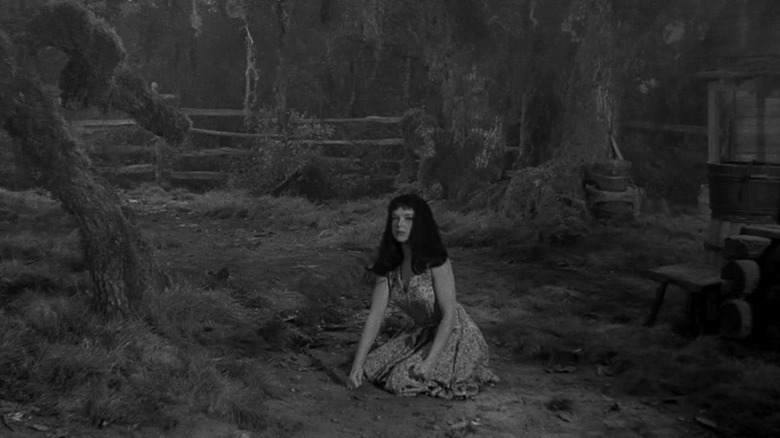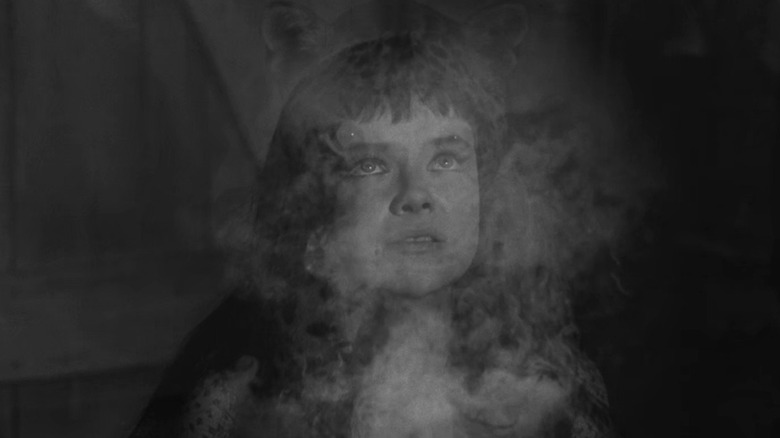A Seven-Day Deadline Miraculously Led To One Of The Twilight Zone's Best Episodes
For as much as Rod Serling's landmark anthology series "The Twilight Zone" reinvented the genre of science fiction storytelling, many of its best episodes also deal in the world of the fantastical, whether through witches, time-traveling radios, or just plain inexplicable phenomena. What kept "The Twilight Zone" consistent through it all is its focus on human nature and irony, the idea of following desire ultimately leading to one's downfall. You can see that in many of the classic episodes of the show, no matter what the genre is.
That focus on human drama is what keeps "Jess-Belle," a most unusual episode of "The Twilight Zone," in the running for the show's top tier. For one, "Jess-Belle" came out of the show's difficult fourth season, during which CBS had contracted hour-long episodes, twice as long as the episodes' usual length, per Marc Scott Zicree's indispensable "Twilight Zone Companion." While "Twilight Zone" was a perfect half-hour show, with just enough time to explore the depths of its premises, the added strain on the production and writing teams of effectively creating twice the amount of material did not result in the show's best work.
Part of the strain, meanwhile, came from Rod Serling's relative absence through the show's fourth season. While Serling was still busy as a writer for the show, his hosting bits, one of the most iconic details of the show, were greatly simplified to more efficiently use production time and to work around his schedule.
"Jess-Belle" could have been a casualty of the shift in "The Twilight Zone." It was written and filmed on a remarkably efficient timeline, so much so that it became the only Rod Serling-era episode of the show to not feature Rod Serling's closing, moralistic narration. Despite all that, it became one of the show's most bewitching episodes.
Twilight Zone struggles
For "Jess-Belle" writer Earl Hamner, Jr., who had come on during the show's third season, the complicated production of the show's fourth season was something of a boon. His previous episodes, "The Hunt" and "A Piano in the House," were hardly stand-outs of the show — Marc Scott Zicree even dismissed "The Hunt" as "hillbilly, Hollywood style" but not at the expense of Hamner. Given Hamner's clear talent as a writer (and his eventual creation of the classic, semi-autobiographical program "The Waltons"), the fault had more to do with the Hollywood production missing the mark on the script.
The writer, who hailed from Schuyler, Virginia, had struggled some in Los Angeles while waiting for work. Per Zicree, it took a letter to former acquaintance Rod Serling for him to get anything steady while he exhausted his savings. Serling brought him on for those episodes, and he had effectively joined the "Twilight Zone" writers room. Unfortunately, after the show's third season was completed, it was effectively canceled, with no new episodes ordered for CBS's Fall season in 1962.
The fourth season was eventually ordered, with hour-long episodes and most of the staff unprepared to return to the work. That included Serling, who probably relished having at least one episode where he didn't have to narrate the conclusion.
The transition period was chaotic at best. Midway through the season, new producer Herbert Hirschman had a script "knocked out from under" him, and he called the reliable Hamner to come up with a new one. He had a reputation for his interest in rural characters and backwoods situations, which was exactly what new producer Herbert Hirschman was looking for. He gave Hamner freedom in writing the new script, but with one major directive: finish it in seven days.
How Hamner finished the Jess-Belle Script
Herbert Hirschman had called Earl Hamner, Jr. on a Friday. "Herb," Hamner recalled saying. "It usually takes me a week to think of an idea." But by Monday, according to "The Twilight Zone Companion," Hamner had an outline. When he called Hirschman to pitch it, Hamner was told he had to have his draft finished by Friday for work to begin on the episode.
Somehow, Hamner did finish his script in seven days, crafting in it one of the show's best, weirdest, most underrated episodes: a tale of lust, deceit, and a woman turning into a leopard. One of the special features of a Hamner script was his ability to fuse a strong handle on Southern characterization and dialogue with the "Twilight Zone" concept. While most of the show's episodes deal with urban areas or sci-fi landscapes, Hamner was capable of giving the show a country feel. As Rod Serling's opening narration states, it's the kind of story "best told by an elderly grandfather on a cold winter's night."
His script for "Jess-Belle" drew from backwoods mythology and for the classic 1942 Jacques Tourneur film "Cat People," the horror movie that practically invented the jump scare. The titular character, Jess-Belle (Anne Francis), is a spurned woman in the Blue Ridge mountains. When her former lover Billy-Ben (James Best) asks for the hand of the respectable Ellwyn (Laura Devon) in marriage, she turns to witchcraft for help. As "The Twilight Zone" goes, she makes a deal with the devil: Billy-Ben will fall in love with Jess-Belle, but she will turn into a leopard every night.
Southern gothic Twilight Zone
One interesting thing about "Jess-Belle" is its relaxed pace, the ways in which it draws scenes out naturally. Where most of the show's hour-long episodes drag on to hit the runtime, "Jess-Belle" uses its Southern horror atmosphere beautifully, thanks to both Earl Hamner, Jr.'s script and the direction of Buzz Kulik, who uses smoky dissolves to convey the character's transformations.
Much like Hamner and producer Herbert Hirschman, Kulik fell in love with the script. He noted that Hamner "had such a good ear for these people ... they all rang true." Leaning into the desperation of Jess-Belle as she becomes gradually more inhuman, Kulik extracts all the atmosphere he can out of the interactions. Scenes are played quietly, and the scenes with the witch Granny Hart (Jeanette Nolan), in which the tragedy of Jess-Belle's situation really sets in, are especially effective.
"Jess-Belle" is also one of the few "Twilight Zone" episodes to get into monster movie territory. While the show mostly leaned towards a more sophisticated and ironic sense of horror, this one fully lays out the danger of the situation. When the leopard is killed a little over halfway through the episode, you wonder how they'll fill up the rest of it. But they do, in one of the more frightening acts in the show's history.
"Jess-Belle" may be too personal to the writer, and too unlike the rest of the show to be listed among its most relevant episodes. But for an anthology show, and especially for one of the most troubled productions in the show's history, it's incredibly distinctive.



